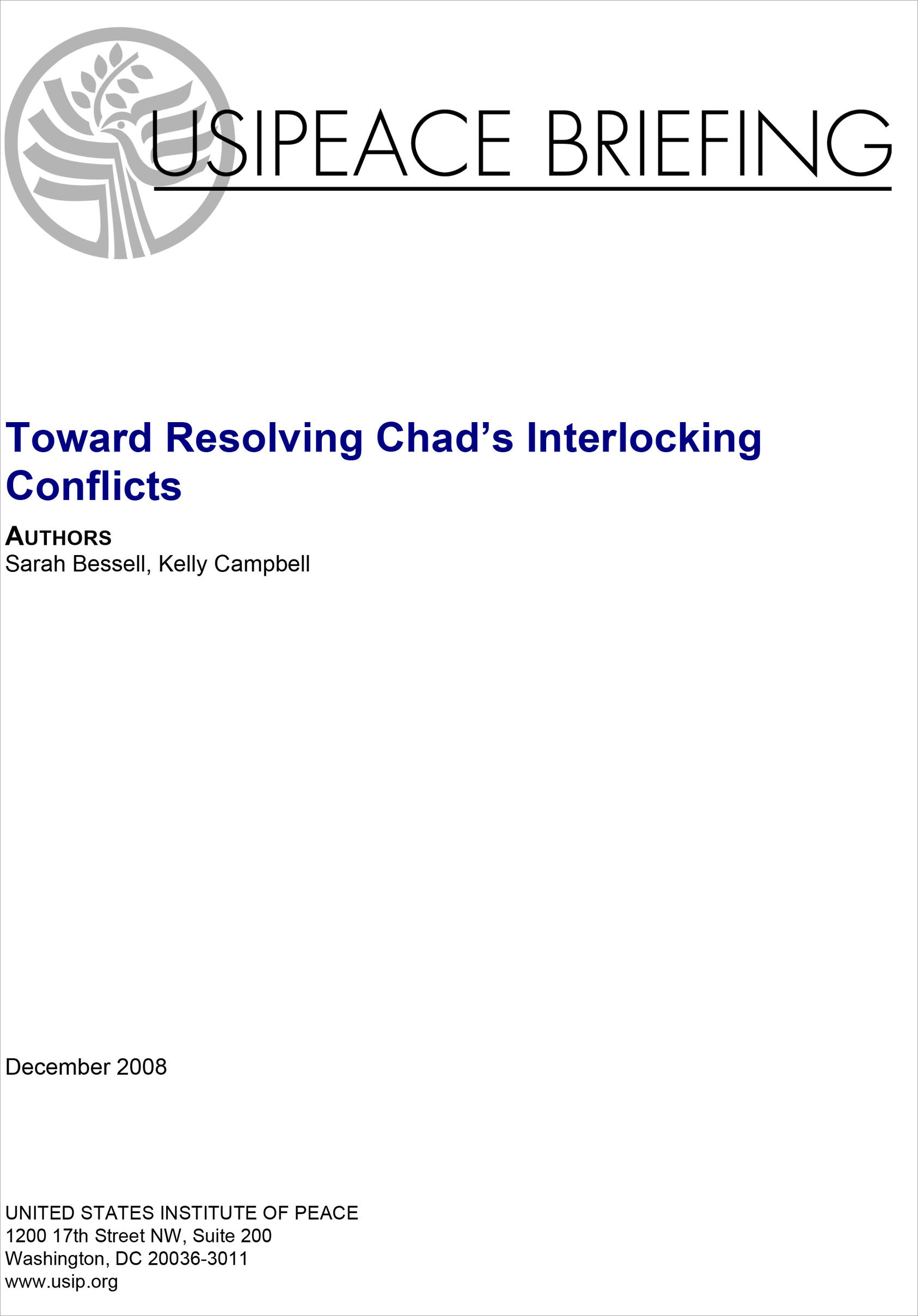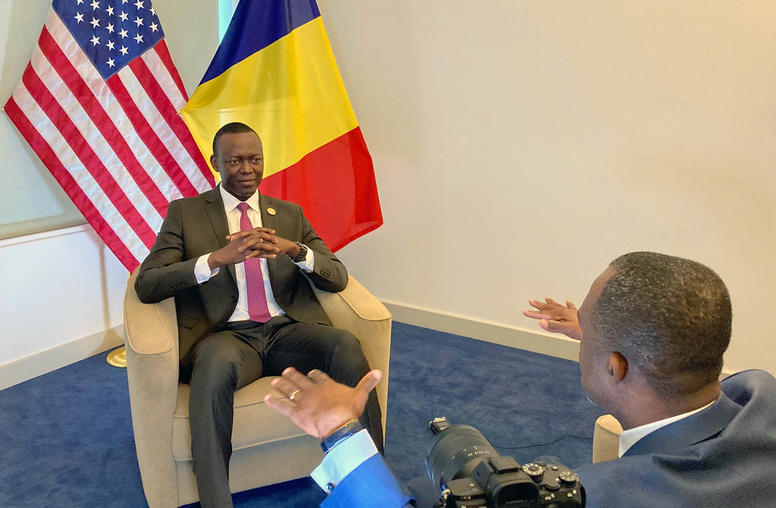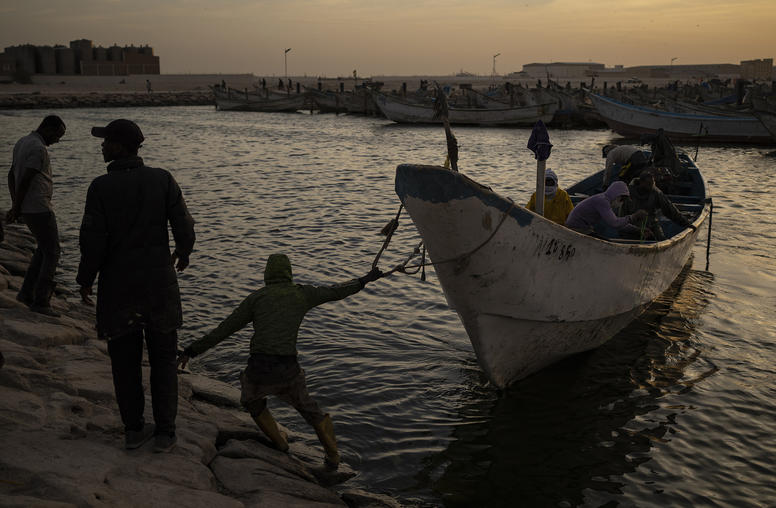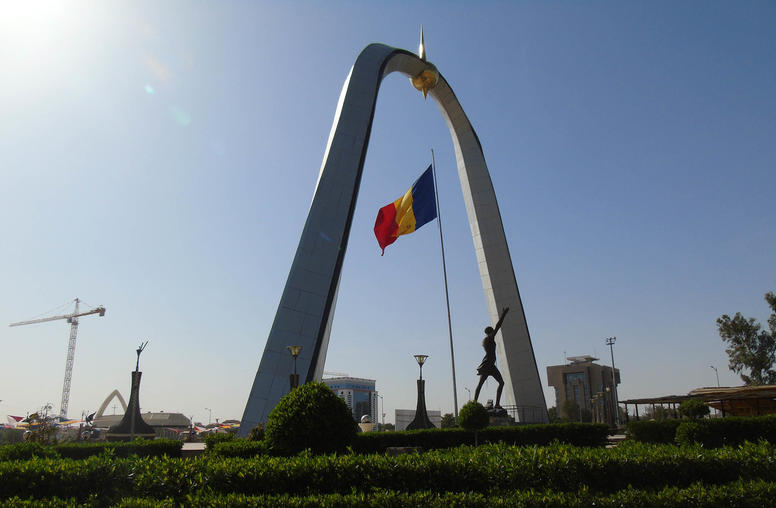Toward Resolving Chad’s Interlocking Conflicts
The fragility of the Chadian government, as well as the fragmentation among Chadian civil society, political parties, and rebel movements, poses significant challenges that Chadian civil society, regional governments, African institutions and the international community must address with a coordinated strategy. Although the situation in the country is often examined through the lens of the Darfur crisis, several internal factors drive the instability in Chad and its regional actions.

Synopsis
This USIPeace Briefing, based on a recent event, explores the internal, regional, and international components of the crisis in Chad.
Overview
The fragility of the Chadian government, as well as the fragmentation among Chadian civil society, political parties, and rebel movements, poses significant challenges that Chadian civil society, regional governments, African institutions and the international community must address with a coordinated strategy.
Although the situation in the country is often examined through the lens of the Darfur crisis, several internal factors drive the instability in Chad and its regional actions. Thus far, efforts to address the political, security and humanitarian problems in Chad have seemed piecemeal and uncoordinated. A consensus is building that a comprehensive strategy encompassing the national, regional and international dimensions of the crisis is needed to move toward peace and stability both within Chad and between Chad and its neighbors.
In October 2008, USIP and the International Peace Institute, in collaboration with Caring for Kaela, sponsored a multi-stakeholder consultation to address the political instability in Chad and its regional implications. The attendees included representatives from the Chadian diaspora, ambassadors from countries in the region, U.N. and EU representatives and experts from the non-governmental community and academia.
This report summarizes the consultation’s main themes and recommendations. The first section addresses the security, political and humanitarian situation in Chad; examines the August 13 Political Agreement between the Chadian government and opposition parties and suggests ideas for the way forward. The second section focuses on the regional dynamics, including the tension between Chad and Sudan, the crisis in the Central African Republic (CAR) and progress on the implementation of the Dakar Agreement, a pan-African initiative. The third section examines the international response to the crisis in Chad, including the role of the EU and U.N. and critical international stakeholders such as France, the U.S., and China.
Internal Crisis in Chad: Political, Security, and Humanitarian Dimensions
Following the rebel attack against the Chadian government in February 2008, President Idriss Déby declared a state of emergency and enacted security measures to buttress the capital, N’djamena, against possible future rebel assaults. There are an estimated 15,000 rebels in Chad1, divided into three primary2 and several smaller factions, many of them based in Sudan and led by defectors from Chad’s military. The rebels are fragmented, and they seem to lack any clear political vision or agenda for the country, focusing only on overthrowing Déby. The insurrectionists oppose militarily what other groups in Chad oppose politically, namely the mismanagement of oil revenues, corruption, ethnocentrism and the centralized, divisive and oppressive character of the Chadian government. Déby’s regime has relied on state repression and ethnic polarization to maintain power, monopolizing access to resources, particularly profits from the oil industry. His regime has pitted the northern region against the south and favored his ethnic group, the Zaghawa, over others. As a result, many sectors of Chadian society feel excluded from the political process and seek an inclusive peace process leading to a transition that will culminate in free and fair elections. The relative weakness and fragmentation of political parties and civil society in Chad, and their competition against each other, make it more difficult for them to effectively challenge the Déby government—and for the international community to meaningfully engage them.
A fragile humanitarian situation, particularly in eastern Chad, compounds the challenges posed by Chad’s tense political and security environment. Approximately 185,000 internally displaced persons (IDPs) and 290,000 refugees inhabit camps throughout eastern Chad. Violence and human rights violations in the camps are common, including gender-based violence and recruitment of child soldiers by rebels within the camps. Security has deteriorated in the last 18 months, despite the presence of the European Union force in Chad (EUFOR). Clashes between different communities and criminality in the camps have increased. Humanitarian workers, who are increasingly targeted with violence, can reach some areas for only one or two hours a day, and have no access to others. Thus far, the international presence in Chad—both EUFOR and the U.N. Mission in the Central African Republic and Chad (MINURCAT)—has concentrated on the protection of civilians in and near refugee camps, with the goal of improving security conditions and enhancing local government capacity to facilitate the IDPs’ voluntary return. To accomplish this, greater assistance will be needed in disarmament, demobilization, reintegration, and rehabilitation efforts, food security, and the improvement of local infrastructure, rule of law and security.
In conjunction with these efforts to improve the humanitarian situation, corresponding progress on political reconciliation must be achieved. The August 13 Political Agreement, signed in 2007 by the ruling party and several opposition parties, maps out a democratic path in Chad and paves the way for competitive elections in 2009. The accord includes provisions for establishing an independent national electoral commission in charge of the electoral process, aims to construct an environment in which elections can be held and highlights the necessary institutional reforms that must take place in order to further democracy in Chad. Although implementation of the agreement has stalled—indeed, the rebel attack on N’djamena occurred only six months after the signing of the agreement—it is still widely seen as the only framework for further reconciliation and democratization. Recently, the parties have displayed a renewed commitment to the agreement’s implementation, though it should be broadened and strengthened if it is to be successful. In particular, conference participants pointed to the need to reinforce political parties and civil society, train the media and allow for domestic electoral observation. Moreover, focusing on local-level conflict resolution efforts and capacity building are also important. Both are areas on which the international community can engage.
One criticism of the August 13 agreement is that it does not provide for adequate involvement of political parties that did not sign the agreement, civil society groups or the diaspora. It also leaves out the armed opposition, a primary spoiler in the process. To remedy this gap, some in the diaspora and civil society within Chad suggest convening an inclusive dialogue among all stakeholders, including the government of Chad, to discuss the root causes of instability there. Items for discussion could include justice and rule of law issues, administrative reform, strengthening national institutions, and formulating a strategy to end the current crisis. This dialogue would also be an opportunity to build trust among the parties involved and to garner support for a peace process at the national and regional levels.
The Regional Dimension
Beyond national tensions, a high level of mistrust exists between Chad and Sudan and fuels the humanitarian crisis along their shared border. The deterioration of relations between the regimes of Déby and Sudanese President Omar Bashir have led to an escalating proxy war in which each government supports rebels in the other’s country. Déby’s links to the Justice and Equality Movement (JEM) rebels in Darfur are so strong that JEM forces played a vital role in defending Déby’s regime during the February assault. Meanwhile, the Bashir government supported the Chadian rebels who launched the attack. In fact, the government of Sudan (GOS) seems to believe that Déby’s support to Darfur rebel groups is so great that the only way for the GOS to win the war in Darfur is to overthrow Déby.
At the urging of regional governments, Déby and Bashir have signed several agreements to improve relations between their countries, but thus far none have been implemented. Currently, regional governments are working with Chad and Sudan to implement the Dakar Agreement, signed in March 2008 by Déby and Bashir and brokered by President Abdoulaye Wade of Senegal. The agreement states that Déby and Bashir will take the necessary measures to achieve peace and stability in their countries and the region, normalize relations, and renew the commitments they previously reached in Tripoli (February 2006), Khartoum (August 2006), Cannes (February 2007) and Riyadh (May 2007). Unlike these previous agreements, the Dakar Agreement called for the formation of a contact group to monitor implementation of the agreement and document violations. Led by Libya and the Republic of Congo (ROC), the group also includes representatives from the governments of Senegal, Gabon, Chad, Sudan, and Eritrea, the Community of Sahel-Saharan States (CEN-SAD), the Economic Community of Central African States (ECCAS), the Organization of the Islamic Conference (OIC), MINURCAT and the African Union (AU). The group has met regularly since March.3
The contact group is also responsible for establishing a Peace and Security Force, a joint mission called for in the Dakar Agreement to secure the border between Chad and Sudan. Thus far, financial resources and equipment for the border force have not materialized, and the contact group has requested international assistance. However, questions have arisen about whether this force will be able to accomplish its mission, given manpower constraints (with African troops already committed in Darfur) and the presence of international missions in both Sudan and Chad that are perhaps better suited to perform this task. Nevertheless, regional and international actors are united in their support for the contact group and the Dakar Agreement.
Libya has played a leading role in efforts to reduce tension between the government of Chad and the armed opposition negotiating the Sirte Agreement (2007), hosting the parties during the negotiation of the Tripoli Agreement and working to implement all agreements. In addition, the Libyan government has stated that its support for an extended, inclusive dialogue about national reconciliation in Chad rests on the belief that such a dialogue, accompanied by economic and social reform, is the only path to peace and security for Chad and its neighbors.
To resolve the regional crisis, it is also necessary to address the security vacuum in the eastern regions of the Central African Republic (CAR)—a no man’s land with virtually no central government administration that could be used as a launching point for rebellions throughout the region. Indeed, rebels from both Chad and Sudan have taken refuge in or launched offensives from eastern CAR. The small EU force in CAR should be strengthened—perhaps with a U.N. force —in order to help CAR’s political process move forward. Countries and institutions that have pledged resources for CAR should be encouraged to deliver on those promises. Both Déby and CAR President François Bozizé support the continuance of an international presence in CAR.
Role of the International Community
EUFOR
A major discussion topic was the expiration of EUFOR’s mandate on March 15, 2009, since no extension of that mandate is expected. Participants emphasized the need to avoid a security vacuum by deploying a second, stronger, U.N. mission, MINURCAT II, before March 15 in order to assume EUFOR’s duties. These duties include maintaining a military presence to provide security around the camps and train Chadian gendarmes to provide security inside the camps. Ominously, the March deadline falls during the dry season, when rebel activity is most likely. Without a replacement force, it is likely that there will be a deterioration in the security situation and a decline in humanitarian access, and perhaps even a cessation of humanitarian activities. Many hope that some contributors to EUFOR will consider rehatting and joining MINURCAT II. France is currently providing all logistical and air transport for EUFOR and, though not willing to rehat its troops for MINURCAT II, France may continue to provide its current services.
Before EUFOR is rehatted by the U.N., an evaluation of the U.N.’s understanding of what it is inheriting both in terms of force and context should occur. While it is encouraging that MINURCAT II will continue to focus on the implementation of the current mandate, improving the quality and presence of military and police forces in both Chad and CAR will be necessary. In the end, the fundamental question is not so much who is present in eastern Chad, but what the force is going to do. Without a clear consensus, strategy, and roadmap, it is unlikely to succeed.
MINURCAT
MINURCAT operates in conjunction with EUFOR, which provides security as a prerequisite for the deployment of MINURCAT’s civilian staff and police. The mission has no political mandate to reconcile parties, but aims to contribute to the national resolution of the conflict by strengthening local capacities. Thus far 324 national police officers and gendarmes have been screened, trained, armed and supported by MINURCAT; more were expected to deploy at the end of October. Out of these, 100 were deployed at the end of September to maintain law and order in IDP and refugee camps, key towns and surrounding areas in eastern Chad.4
Like EUFOR, MINURCAT’s mandate does not address the root causes of the conflict. While the Chadian government requested that the U.N. intervene during the February attack—an opportunity missed by the international community to broaden its mandate, according to many —the government has now limited the U.N. presence to training and security purposes only. As a result, there have been concerns that the U.N. presence will have little value on the ground, prompting the U.N. Department of Peacekeeping Operations (DPKO) to propose an expansion of the force to the U.N. Security Council, but this was rejected.
MINURCAT II
Participants agreed that the new U.N. force that will take over from EUFOR, MINURCAT II, should consist of troops from all over the world, not just Europe. The U.N. hopes for strong participation from African states, which the government of Chad also endorses. However, the U.N. faces some constraints from potential troop contributing countries, in particular, since the pool of potential French speaking civilian police is limited. The new force will also have to be a bigger force; EUFOR has 3,700 troops on the ground, and in order to make a difference it has been proposed that the troop level be increased to 6,000 for MINURCAT II.
The Security Council met in November to discuss MINURCAT II taking over EUFOR. Discussions between the U.N. and Chad have been successful thus far in terms of the future U.N. force’s regional mandate. Working with the government of Chad, MINURCAT II will adopt strategies to implement rule of law, promote respect for human rights and try to complement civilian dialogue processes in eastern Chad. As proposed in the Dakar agreement, MINURCAT II will continue to participate in the contact group as an observer. To some participants’ dismay, the new U.N. mandate neither addresses the conflict in Chad nor facilitates a national reconciliation process. The U.N. is limited by the fact that the Chadian government conditions the U.N. presence on its non-interference in internal politics. In this regard, MINURCAT II’s mandate would not send troops to defend the government or impede rebel encroachment.
While the mandate should be broad enough to address the complexities of the crisis and challenges facing Chad and deal with underlying problems, this is insufficient for success. As one participant noted, without adequate resources to back up an expanded mandate, the right organizational structure, and political support, further problems could arise. In the case of Chad, a narrow mandate that is well supported and properly equipped may be preferable to a broader mandate that lacks sufficient resources.
Coordination among U.N. missions in Chad and Sudan
The U.N. should be prepared to remain in Chad and the region for the long term, since the regional dimensions of the problem warrant an extended peacekeeping operation. Currently, the U.N. lacks a coherent strategy for the region and clearly defined rules of engagement—not all of which can be blamed on the U.N., as the governments of Chad and Sudan discourage communication between the U.N. missions in the region. The U.N. has tried to convince the governments that cooperation among and between the missions is beneficial for everyone, and a liaison office between MINURCAT and the AU/U.N. Hybrid operation in Darfur (UNAMID)5 exists; however, it has a low-key operation since it is unpopular with governments. Nevertheless, in recent months, the U.N.’s dialogue with the Chadian government has been much better than expected. While the government does not want to be forced to act solely because of international pressure, it seems to be genuinely ready for a consultative process to take place.
The Way Forward: Recommendations and Conclusion
The consultation concluded with a discussion on the major themes and recommendations identified during the event.
Internal Dimension
Participants agreed that there is a need to continue implementation of the August 13 agreement, strengthen national dialogue and reconciliation efforts and support the role of civil society and the diaspora. Although implementation of the agreement has stalled, renewed commitment is necessary if Chad hopes to hold competitive presidential elections in 2011. Civil society and the diaspora have a large role to play in this, although civil society and the political class in Chad remain fragmented. There is a clear need to strengthen civil society in Chad, with which stakeholders at the national, regional and international levels can assist. In this endeavor, non-governmental organizations have more flexibility to work with Chadians on national reconciliation efforts, due to the U.N.’s mandate constraints. Thus, in addition to Track 1 initiatives in the diplomatic arena, Track 1 ½ or Track 2 dialogues could mobilize smaller groups in semi-public or semi-private dialogues.
Regional and International Dimensions
Much of the discussion emphasized the need for a comprehensive strategy to address the regional dimensions of the crisis. The deterioration of relations between Chad and Sudan has created severe regional mistrust. Commitment to the Dakar Agreement must be maintained in order to renew relations between the two countries. Following the exchange of ambassadors between Sudan and Chad in November, the contact group met to announce that both countries will deploy troops at a dozen outposts along the border in an attempt to prevent future rebel incursions.6 This renewal of relations is a positive step for the region. The international community should develop a comprehensive, coordinated strategy for the region that prioritizes the March 15 transfer of EUFOR to MINURCAT II and ends the proxy war between Chad and Sudan. Finally, serious efforts must be made to close the security gap that exists in eastern CAR.
While the international community can contribute to establishing a secure environment in which negotiations between Chad and Sudan can take place, it seems impossible for international actors to address the root causes of 50 years of political instability within and between these two countries. The international community can, however, continue to support the implementation of peace agreements and the re-establishment of trust between Chad and Sudan. While resolving the regional component of this crisis would require the U.N. and other countries to wade into Zaghawa politics and the politics of regime survival—driving forces in both Chad and Sudan—undertaking such an effort may be the only way for the international community to convince Chad and Sudan’s governments that making peace benefits them more than continuing their current insurgency and counterinsurgency strategies.
France, the U.S. and China were identified as stakeholders with the potential to create more stable regional conditions. France seems interested in extricating itself from Chad, and could perhaps be encouraged to take actions that could hasten an exit by improving internal and regional security. The U.S. already has a burgeoning relationship with Chad and has reasons for furthering this engagement, including its interests in Sudan (particularly Darfur), oil, counterterrorism and border security efforts like the Trans-Sahara Counter Terrorism Initiative. China is heavily invested in oil exploitation in Sudan and has bought in to oil stakes in Chad, so it has leverage on both sides. The international community can also continue to encourage regional peacemaking efforts from countries such as Libya, Senegal and the ROC.
Notes
1. This statistic was cited by one participant at the conference.
2. The three main rebel groups are: the United Front for Change and Democracy, the National Alliance, and the Rally of Forces for Change.
3. Relations between Chad and Sudan were re-established by the exchange of ambassadors on November 9, 2008, marking the resumption of diplomatic ties between the two countries.
4. United Nations Security Council, “Report of the Secretary-General on the United Nations Mission in the Central African Republic and Chad,” (S/2008/601), September 12, 2008, paras 23 – 24.
5. USIP has been involved in training Rwandan troops for this force. See PeaceWatch, June 2008: [pdf].
6. "Chad and Sudan plan deployment to secure border,” Reuters AlertNet, 16 November 2008.
This USIPeace Briefing was written by Sarah Bessell and Kelly Campbell, research assistant and senior program assistant, respectively, in the Center for Conflict Analysis and Prevention at the United States Institute of Peace. The views expressed here are not necessarily those of USIP, which does not advocate specific policies.
The United States Institute of Peace is an independent, nonpartisan institution established and funded by Congress. Its goals are to help prevent and resolve violent international conflicts, promote post-conflict stability and development, and increase conflict management capacity, tools, and intellectual capital worldwide. The Institute does this by empowering others with knowledge, skills, and resources, as well as by directly engaging in peacebuilding efforts around the globe.



